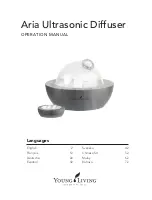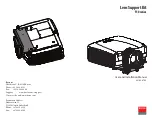
5
2. TECHNICAL INFORMATION AND OPERATING LIMITATIONS
Flight operation of the Sting Ray should be limited to non-aerobatic maneuvers, those in which the
pitch angle will not exceed 30 degrees nose up or nose down from the horizon and bank angle will
not exceed 60 degrees.
Wing area, sq.m. (sq.ft.)
12.85 (138)
Wing span, m (ft.)
9.6 (31.5)
Aspect ratio
6.95
Nose angle,
128
Weight (with hang bracket and trim device, without bags), kg (lb)
63.6 (140.2)
Number of upper sail battens
26
Number of bottom sail battens
8
Double sail, %
86
Range of operating overloads
+4/-2
Ultimate tested strength, G
+6/-3
Wind speed max, m/sec (mph)
10 (22)
Min. airspeed, km/h (mph)
60 (37)
Range of trim speed, km/h (mph)
90-130 (56-81)
Max. airspeed, km/h (mph)
161 (100)
Max. take-off weight, kg (lb)
472.5 (1041.7)
Aeros recommends that no attempt should ever be made to deliberately spin a trike with this wing
or any wing.
The stability, controllability, and structural strength of a properly maintained Sting Ray have been
determined to be adequate for safe operation, when the wing is operated within the entire
manufacturer specified limitations.
No warranty of adequate stability, controllability, or structural strength is made or implied for
operation outside of these limitations.
Operating the Sting Ray outside of the above limitations may result in injury and death.
Flying a trike with the Sting Ray wing in strong or gusty winds or turbulence may result in loss of
control of the wing, which may lead to injury and death.
Do not fly in such conditions unless you realize and wish to personally accept the associated risks.
3. STING RAY REASSEMBLY AFTER SHIPPING PROCEDURE
Before beginning, read through the section 5. STING RAY SET-UP PROCEDURE and section
11. REMOVING THE SAIL FROM THE FRAME AND RE-INSTALLING.
While following the instructions in this section, refer to the photos and descriptions in sections 5
and 11 for reference, if necessary.
1. Unzip the wing bag. Undo the Velcro straps. Remove battens, the control bar and the outer
leading edge tubes from the wing bag. Remove all packing material.
2. Unfold the sail along the leading edge to its full length. Attach the outer leading edge tubes to
the front leading edge tubes according to the markings: L-left, R-right. The triangular marking on
the leading edge tube #3 and the triangular marking on the leading edge tube #2 should match
together (fig. 1, shown without the sail).
Working on one wing at a time and working with the appropriate leading edge # 3, fold the outer
sprog, which is attached to the outer leading edge tube, forward. Slide the inboard end of the
leading edge tube # 3 into the sail.
Align the outer leading edge properly so that the sprog bracket is on the inside of the leading edge,
and slide the outer leading edge tube forward carefully until it engage completely on the front
Summary of Contents for Sting Ray
Page 2: ...2...
Page 29: ......
Page 30: ......
Page 31: ......
Page 32: ......
Page 33: ......
Page 34: ......
Page 35: ......
Page 36: ......
Page 37: ......
Page 38: ......
Page 39: ......
Page 40: ......
Page 41: ......
Page 42: ......
Page 43: ......
Page 44: ......
Page 45: ......
Page 46: ......






































